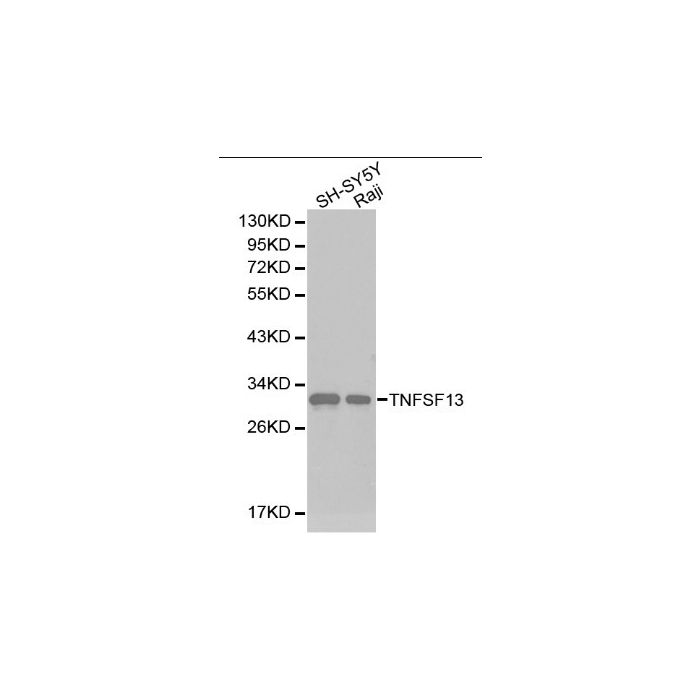CD256 (APRIL) polyclonal, anti-human
€388.00
In stock
SKU
BS6279
Background:
A proliferation-inducing ligand (APRIL), also designated TNFSF13, is a Type II membrane protein that shares characteristics with other members of the tumor necrosis factor (TNF) cytokine family. APRIL is expressed in high levels in transformed cell lines and in human colon, thyroid, and lymphoid tumor tissues. APRIL is critically involved in the regulation of infections, inflammation, autoimmune diseases, and tissue homeostasis. APRIL is implicated in the regulation of tumor cell growth. The C-terminal extracellular domain has b jelly roll topography and is important in ligand trimerization. The binding of the ligand to its respective receptor induces oligomerization, initiating downstream signaling events. Intrinsic to oligomerization is the formation of the receptor binding site at the junction between neighboring subunits, creating a multivalent ligand.
Alternative Name:
Tumor necrosis factor ligand superfamily member 13, A proliferation-inducing ligand, APRIL, TNF- and APOL-related leukocyte expressed ligand 2, TALL-2, TNF-related death ligand 1, TRDL-1, TRDL1, CD256, TNFSF13, APRIL, TALL2, ZTNF2, ORF Names: UNQ383/PRO715
Application Dilution: WB: 1:500 - 1:2000, IHC: 1:50 - 1:200
Specificity: APRIL polyclonal antibody detects endogenous levels of APRIL protein.
Immunogen:
Recombinant full length Human APRIL.
MW: ~ 22 to 32 kDa
Swis Prot.: O75888
Purification & Purity:
The antibody was affinity-purified from rabbit antiserum by affinity-chromatography using epitope-specific immunogen and the purity is > 95% (by SDS-PAGE).
Format:
1mg/ml in PBS with 0.1% Sodium Azide, 50% Glycerol.
Storage:
Store at 4°C short term. Aliquot and store at -20°C long term. Avoid freeze-thaw cycles.
For research use only, not for use in diagnostic procedure.
A proliferation-inducing ligand (APRIL), also designated TNFSF13, is a Type II membrane protein that shares characteristics with other members of the tumor necrosis factor (TNF) cytokine family. APRIL is expressed in high levels in transformed cell lines and in human colon, thyroid, and lymphoid tumor tissues. APRIL is critically involved in the regulation of infections, inflammation, autoimmune diseases, and tissue homeostasis. APRIL is implicated in the regulation of tumor cell growth. The C-terminal extracellular domain has b jelly roll topography and is important in ligand trimerization. The binding of the ligand to its respective receptor induces oligomerization, initiating downstream signaling events. Intrinsic to oligomerization is the formation of the receptor binding site at the junction between neighboring subunits, creating a multivalent ligand.
Alternative Name:
Tumor necrosis factor ligand superfamily member 13, A proliferation-inducing ligand, APRIL, TNF- and APOL-related leukocyte expressed ligand 2, TALL-2, TNF-related death ligand 1, TRDL-1, TRDL1, CD256, TNFSF13, APRIL, TALL2, ZTNF2, ORF Names: UNQ383/PRO715
Application Dilution: WB: 1:500 - 1:2000, IHC: 1:50 - 1:200
Specificity: APRIL polyclonal antibody detects endogenous levels of APRIL protein.
Immunogen:
Recombinant full length Human APRIL.
MW: ~ 22 to 32 kDa
Swis Prot.: O75888
Purification & Purity:
The antibody was affinity-purified from rabbit antiserum by affinity-chromatography using epitope-specific immunogen and the purity is > 95% (by SDS-PAGE).
Format:
1mg/ml in PBS with 0.1% Sodium Azide, 50% Glycerol.
Storage:
Store at 4°C short term. Aliquot and store at -20°C long term. Avoid freeze-thaw cycles.
For research use only, not for use in diagnostic procedure.
| Is Featured? | No |
|---|
Write Your Own Review

